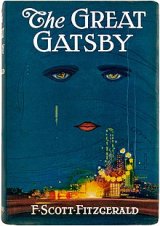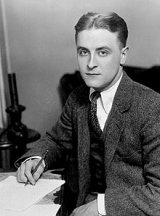The Great Gatsby Page #14
The Great Gatsby is a 1925 novel by American writer F. Scott Fitzgerald. Set in the Jazz Age on Long Island, near New York City, the novel depicts first-person narrator Nick Carraway's interactions with mysterious millionaire Jay Gatsby and Gatsby's obsession to reunite with his former lover, Daisy Buchanan. The novel was inspired by a youthful romance Fitzgerald had with socialite Ginevra King, and the riotous parties he attended on Long Island's North Shore in 1922
Mr. Chrystie’s wife), and Edgar Beaver, whose hair, they say, turned cotton-white one winter afternoon for no good reason at all. Clarence Endive was from East Egg, as I remember. He came only once, in white knickerbockers, and had a fight with a bum named Etty in the garden. From farther out on the Island came the Cheadles and the O. R. P. Schraeders, and the Stonewall Jackson Abrams of Georgia, and the Fishguards and the Ripley Snells. Snell was there three days before he went to the penitentiary, so drunk out on the gravel drive that Mrs. Ulysses Swett’s automobile ran over his right hand. The Dancies came, too, and S. B. Whitebait, who was well over sixty, and Maurice A. Flink, and the Hammerheads, and Beluga the tobacco importer, and Beluga’s girls. From West Egg came the Poles and the Mulreadys and Cecil Roebuck and Cecil Schoen and Gulick the State senator and Newton Orchid, who controlled Films Par Excellence, and Eckhaust and Clyde Cohen and Don S. Schwartz (the son) and Arthur McCarty, all connected with the movies in one way or another. And the Catlips and the Bembergs and G. Earl Muldoon, brother to that Muldoon who afterward strangled his wife. Da Fontano the promoter came there, and Ed Legros and James B. (“Rot-Gut”) Ferret and the De Jongs and Ernest Lilly—they came to gamble, and when Ferret wandered into the garden it meant he was cleaned out and Associated Traction would have to fluctuate profitably next day. A man named Klipspringer was there so often that he became known as “the boarder”—I doubt if he had any other home. Of theatrical people there were Gus Waize and Horace O’Donavan and Lester Myer and George Duckweed and Francis Bull. Also from New York were the Chromes and the Backhyssons and the Dennickers and Russel Betty and the Corrigans and the Kellehers and the Dewars and the Scullys and S. W. Belcher and the Smirkes and the young Quinns, divorced now, and Henry L. Palmetto, who killed himself by jumping in front of a subway train in Times Square. Benny McClenahan arrived always with four girls. They were never quite the same ones in physical person, but they were so identical one with another that it inevitably seemed they had been there before. I have forgotten their names—Jaqueline, I think, or else Consuela, or Gloria or Judy or June, and their last names were either the melodious names of flowers and months or the sterner ones of the great American capitalists whose cousins, if pressed, they would confess themselves to be. In addition to all these I can remember that Faustina O’Brien came there at least once and the Baedeker girls and young Brewer, who had his nose shot off in the war, and Mr. Albrucksburger and Miss Haag, his fiancée, and Ardita Fitz-Peters and Mr. P. Jewett, once head of the American Legion, and Miss Claudia Hip, with a man reputed to be her chauffeur, and a prince of something, whom we called Duke, and whose name, if I ever knew it, I have forgotten. All these people came to Gatsby’s house in the summer. ------------------------------------------------------------------------ At nine o’clock, one morning late in July, Gatsby’s gorgeous car lurched up the rocky drive to my door and gave out a burst of melody from its three-noted horn. It was the first time he had called on me, though I had gone to two of his parties, mounted in his hydroplane, and, at his urgent invitation, made frequent use of his beach. “Good morning, old sport. You’re having lunch with me today and I thought we’d ride up together.” He was balancing himself on the dashboard of his car with that resourcefulness of movement that is so peculiarly American—that comes, I suppose, with the absence of lifting work in youth and, even more, with the formless grace of our nervous, sporadic games. This quality was continually breaking through his punctilious manner in the shape of restlessness. He was never quite still; there was always a tapping foot somewhere or the impatient opening and closing of a hand. He saw me looking with admiration at his car. “It’s pretty, isn’t it, old sport?” He jumped off to give me a better view. “Haven’t you ever seen it before?” I’d seen it. Everybody had seen it. It was a rich cream colour, bright with nickel, swollen here and there in its monstrous length with triumphant hatboxes and supper-boxes and toolboxes, and terraced with a labyrinth of windshields that mirrored a dozen suns. Sitting down behind many layers of glass in a sort of green leather conservatory, we started to town. I had talked with him perhaps half a dozen times in the past month and found, to my disappointment, that he had little to say. So my first impression, that he was a person of some undefined consequence, had gradually faded and he had become simply the proprietor of an elaborate roadhouse next door. And then came that disconcerting ride. We hadn’t reached West Egg village before Gatsby began leaving his elegant sentences unfinished and slapping himself indecisively on the knee of his caramel-coloured suit. “Look here, old sport,” he broke out surprisingly, “what’s your opinion of me, anyhow?” A little overwhelmed, I began the generalized evasions which that question deserves. “Well, I’m going to tell you something about my life,” he interrupted. “I don’t want you to get a wrong idea of me from all these stories you hear.” So he was aware of the bizarre accusations that flavoured conversation in his halls. “I’ll tell you God’s truth.” His right hand suddenly ordered divine retribution to stand by. “I am the son of some wealthy people in the Middle West—all dead now. I was brought up in America but educated at Oxford, because all my ancestors have been educated there for many years. It is a family tradition.” He looked at me sideways—and I knew why Jordan Baker had believed he was lying. He hurried the phrase “educated at Oxford,” or swallowed it, or choked on it, as though it had bothered him before. And with this doubt, his whole statement fell to pieces, and I wondered if there wasn’t something a little sinister about him, after all. “What part of the Middle West?” I inquired casually. “San Francisco.” “I see.” “My family all died and I came into a good deal of money.” His voice was solemn, as if the memory of that sudden extinction of a clan still haunted him. For a moment I suspected that he was pulling my leg, but a glance at him convinced me otherwise. “After that I lived like a young rajah in all the capitals of Europe—Paris, Venice, Rome—collecting jewels, chiefly rubies, hunting big game, painting a little, things for myself only, and trying to forget something very sad that had happened to me long ago.” With an effort I managed to restrain my incredulous laughter. The very phrases were worn so threadbare that they evoked no image except that of a turbaned “character” leaking sawdust at every pore as he pursued a tiger through the Bois de Boulogne. “Then came the war, old sport. It was a great relief, and I tried very
Translation
Translate and read this book in other languages:
Select another language:
- - Select -
- 简体中文 (Chinese - Simplified)
- 繁體中文 (Chinese - Traditional)
- Español (Spanish)
- Esperanto (Esperanto)
- 日本語 (Japanese)
- Português (Portuguese)
- Deutsch (German)
- العربية (Arabic)
- Français (French)
- Русский (Russian)
- ಕನ್ನಡ (Kannada)
- 한국어 (Korean)
- עברית (Hebrew)
- Gaeilge (Irish)
- Українська (Ukrainian)
- اردو (Urdu)
- Magyar (Hungarian)
- मानक हिन्दी (Hindi)
- Indonesia (Indonesian)
- Italiano (Italian)
- தமிழ் (Tamil)
- Türkçe (Turkish)
- తెలుగు (Telugu)
- ภาษาไทย (Thai)
- Tiếng Việt (Vietnamese)
- Čeština (Czech)
- Polski (Polish)
- Bahasa Indonesia (Indonesian)
- Românește (Romanian)
- Nederlands (Dutch)
- Ελληνικά (Greek)
- Latinum (Latin)
- Svenska (Swedish)
- Dansk (Danish)
- Suomi (Finnish)
- فارسی (Persian)
- ייִדיש (Yiddish)
- հայերեն (Armenian)
- Norsk (Norwegian)
- English (English)
Citation
Use the citation below to add this book to your bibliography:
Style:MLAChicagoAPA
"The Great Gatsby Books." Literature.com. STANDS4 LLC, 2025. Web. 24 Feb. 2025. <https://www.literature.com/book/the_great_gatsby_1598>.








Discuss this The Great Gatsby book with the community:
Report Comment
We're doing our best to make sure our content is useful, accurate and safe.
If by any chance you spot an inappropriate comment while navigating through our website please use this form to let us know, and we'll take care of it shortly.
Attachment
You need to be logged in to favorite.
Log In